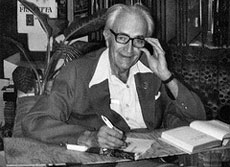Neil Gaiman on The Big Time
The Big Time is told over the course of a couple of hours on a claustrophobically small stage, known as The Place, “a regular theater-in-the-round with the Void for an audience.” The Place is a rest-and-recuperation station for soldiers in a Time War. It is a stage that exists outside of time and space, crewed by three men (Elizabethan Sydney Lessingham, nominally in charge; Doc, a hopelessly alcoholic Russian doctor; and Beau, a riverboat gambler from an alternate American South) and three women, who we are told are as much nurses as they are whores, Maud, Lili (the new girl is always called Lili, after Lili Marlene) and Greta Forzane, our narrator. Their job, to ensure that the soldiers are patched up and sent off happy for their next mission into time.
Greta was killed on North Clark Street during the Nazi invasion of the USA in the early 1940s, in a timeline generated by the Spiders, the side which brought Greta back to life. There are two sides in the Change War, Spiders and Snakes: they both enlist the recently dead in their armies, pluck them from time moments before they die and have them battle to ensure that something, somehow, somewhen, comes out the way it should to (we assume) guarantee one side or the other ultimate victory.
Enter three soldiers (a Nazi stormtrooper, an English poet who died at Paschendale, a Roman), and, later, another three (two aliens, one from the distant past, one from the far future, and a Cretan woman soldier, with labrys): we learn a little about the Change Wars, the poet and the new girl fall in love, an Atomic Bomb is set off and will explode in half an hour, while the Maintainer, the engine that keeps the Place in existence, has mysteriously vanished in what reveals itself and the book, to be a cunningly constructed locked room mystery. The second half of the book—the second act, perhaps—is a resolution of the locked-room mystery (clues have been given; the author plays scrupulously fair with the reader) while never resolving, perhaps scumbling even further, the greater mystery of the nature of the Change War.
Greta is a relatively unreliable narrator, a morally compromised ghost (she describes herself in the second sentence as “twenty-nine and a party girl.”) Dave, the man she loved, was killed fighting Franco, before she died and entered the Big Time. Now she has a hopeless crush on Erich, the Nazi, killed in Narvik in 1940, who, in an alternate Spider-created timeline, went on to become the baby-eating Commandant of Toronto, and she appears to take a peculiar pride in his sadism to her. (As she explains, later, “Using his fists on anybody but me is beneath him”.) Her moral fog, and the alcoholic and moral fog of several of the other characters, are part of the larger fog of the story, and what gives it its power.
As in all wars, soldiers are fighting battles they cannot understand the reason for, will not see the results of. In this war, soldiers see action across time, atrocities occur for reasons that are never explained, the past and the future are relatively fluid, allowing battles to be fought and re-fought. Nobody believes themselves to be fighting on the side of right—they owe allegiance to the side who brought them back from the dead to fight, but with no sense that they are fighting a just battle. As we learn, they have no concept of who or what the Spiders or the Snakes actually are, nor what they ultimately want.
Greta and Lili both change during the story. Lili gets what she wants and loses it, while Greta saves them all and will ever after be distrusted, but is given a smidgen of grace from a long-extinct alien, the hope that the war might be something else, an evolutionary thrust to create beings who exist apart from time.
The Big Time is a remarkably sophisticated story, unusual for science fiction of its time period. It is Leiber's most successful science fiction novel: it contains many of Leiber's pet themes—Shakespeare and the theater, alternate identities, alcoholism and sadomasochism, Germany and Time. It's funny, smart, and resonant, playing out huge themes on a tiny stage, and it demands a great deal of its readers, so it's no surprise that it was rewarded with the Hugo Award for Best Novel in 1958, nor that, over fifty years later, it remains relatively unknown.

Fritz Leiber

Neil Gaiman on The Big Time
Read Biography
Fritz Leiber—The Big Time: An Introduction
Fritz Leiber remembers how he came to write The Big Time in this introduction to the novel, added to a new edition in 1982.Foreword to The Mind Spider and Other Stories
Fritz Leiber Bonus Material
Here are three 1950s radio adaptations of Leiber's stories from the NBC radio program X Minus One plus five Change War stories exploring the war between Spiders and Snakes in The Big Time.Other Novels by Fritz Leiber





 Credit: Kimberly Butler
Credit: Kimberly Butler

